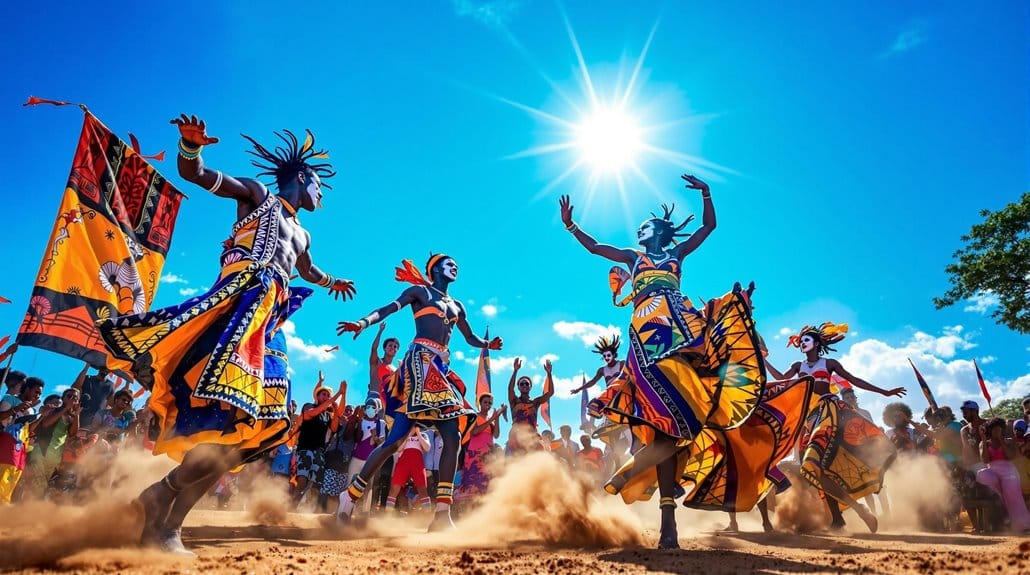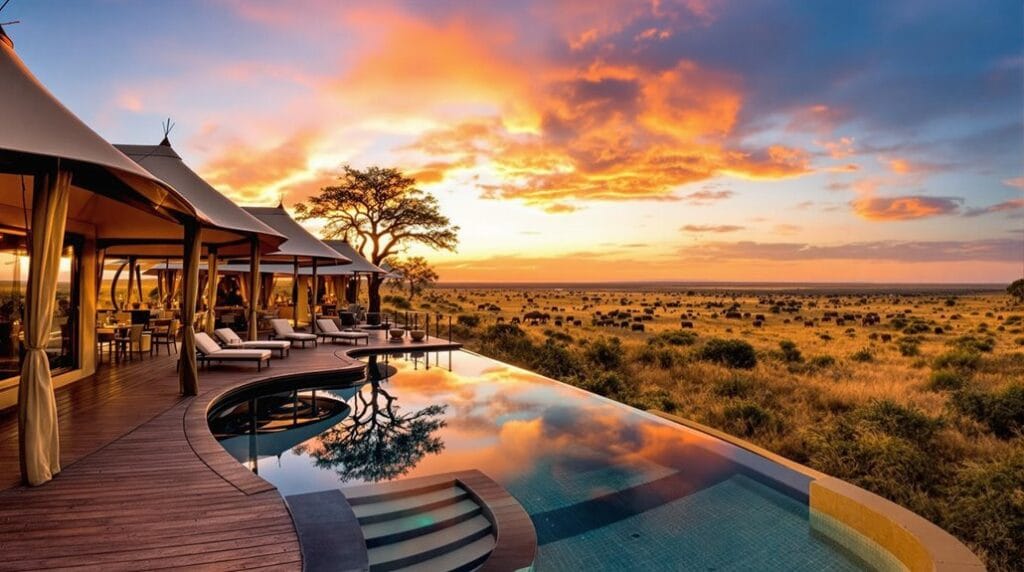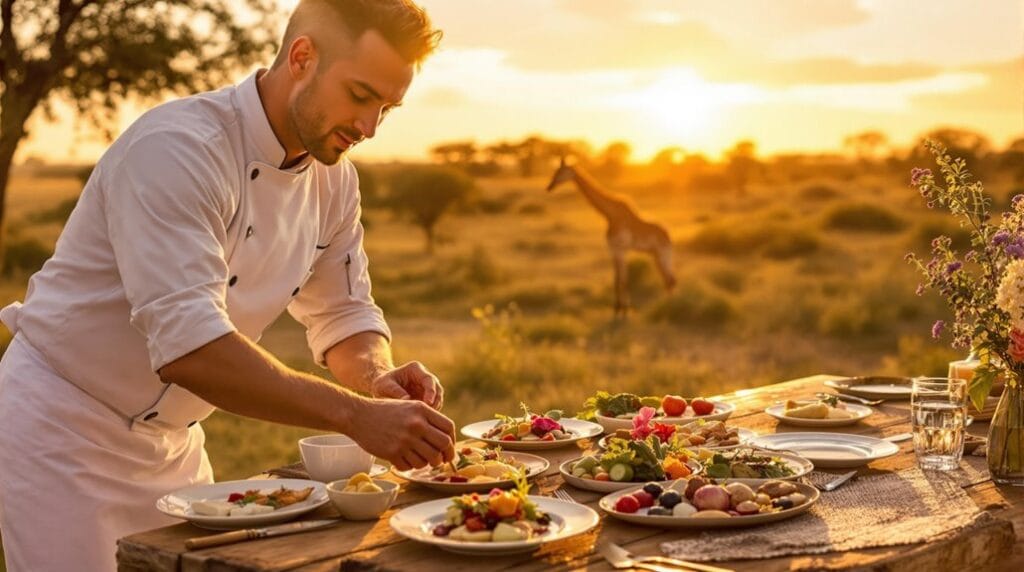You might not realize that Africa hosts over 3,000 distinct ethnic groups, each with their own vibrant festivals that celebrate their unique cultural identities. These events, often rich in tradition and meaning, present a fascinating glimpse into the communal spirit and historical narratives of the people. From the mesmerizing dances of the Gerewol to the colorful displays of Timket, each festival has its own story to tell. What do these celebrations reveal about the societies that hold them, and how can they transform the way we comprehend African culture?
Key Takeaways
- African tribal festivals showcase diverse customs and traditions from over 3,000 ethnic groups, reflecting the continent's rich cultural heritage.
- Events like the Gerewol Festival and Timket foster community unity, reinforcing cultural identity through shared rituals and celebrations.
- Spiritual cleansing rituals, such as the Zangbeto Festival, highlight the connection between physical and spiritual realms in African cultures.
- Unique festivals, including the Bianou and Fire Dancing rituals, offer immersive experiences that celebrate local traditions, music, and cuisine.
- Travel opportunities at these festivals allow explorers to engage with communities, preserving cultural heritage through active participation in vibrant celebrations.
Overview of African Tribal Festivals
African tribal festivals are often vibrant celebrations that showcase the continent's rich cultural tapestry. With over 3,000 ethnic groups, each festival offers a unique glimpse into the diverse customs and traditions that define African identity. You can immerse yourself in the colorful ceremonies, where dancing becomes a powerful expression of community spirit and cultural pride.
Take, for instance, the Gerewol Festival in Chad, where Wodaabe men display their beauty through elaborate dances, reinforcing connections within their tribes. Similarly, the Dipo Initiation Ceremony in Ghana marks significant life changes with communal participation, highlighting the importance of rites of passage in African cultures. These gatherings foster a sense of belonging, drawing people together to celebrate shared heritage.
Moreover, festivals like the Kwita Izina Ceremony in Rwanda showcase the intertwining of cultural celebration and conservation efforts, emphasizing the responsibility of communities to protect their environment while honoring tradition. Each festival not only serves as a joyous occasion but also as a reminder of the unique cultural narratives that shape African identity.
Engaging in these festivities allows you to appreciate the depth of African heritage and the bonds that tie its people together.
Bianou Festival in Niger
Nestled in the heart of Agadez, the Bianou Festival bursts into life each year, enchanting both locals and visitors with its vibrant celebration of Tuareg culture. This annual event, with its date varying each year, creates an electric atmosphere of anticipation throughout the community.
Preparations kick off 23 days in advance, uniting neighborhoods and fostering a true sense of community spirit. During the festival, men proudly wear traditional indigo boubous and turbans styled like roosters' combs, visually showcasing their rich cultural heritage.
The heart of the Bianou Festival revolves around the Etebel drum, a powerful symbol of unity and collective identity among the Tuareg people. This drumbeat echoes the rhythms of life, drawing everyone into a shared experience that reinforces social bonds.
Here's what you can expect at the Bianou Festival:
- Colorful traditional attire
- Energetic drumming and dancing
- Cultural storytelling and performances
- Delicious local cuisine
- A strong sense of belonging and community
The Bianou Festival isn't just a celebration; it's a heartfelt reminder of the resilience and beauty of Tuareg culture amidst the sands of time.
Gerewol Festival in Chad
Every year in October, the Gerewol Festival captivates both locals and tourists alike with its vibrant celebration of Wodaabe culture in Chad. This extraordinary event isn't just about courtship; it's a powerful display of cultural identity that strengthens community bonds among the Wodaabe people.
As a visitor, you can't help but feel the energy as young men adorned in elaborate face paint, beads, and feathers compete for the attention of potential partners.
The heart of the festival is the Yaake dance, where these young men showcase their charm through intricate movements and infectious smiles. Here, beauty transcends mere physical appearance, becoming an art form that reflects personality and spirit. You'll witness the pride in their eyes as they embody the essence of Wodaabe tradition, effortlessly blending celebration with cultural expression.
The Gerewol Festival draws thousands, creating a tapestry of connection between participants and spectators. You'll find yourself immersed in a world where the rhythm of drums echoes the heartbeat of a community, inviting you to embrace their story.
In this vibrant atmosphere, you'll discover a unique sense of belonging, reminding us all of the power of cultural heritage and shared experiences.
Timket Celebration in Ethiopia
In the vibrant heart of Ethiopia, the Timket celebration unfolds each January, drawing thousands to honor the baptism of Jesus Christ with fervent devotion. This sacred event not only marks a significant moment in the Ethiopian Orthodox Church but also fosters a deep sense of community among participants.
As you join the colorful festivities, you'll witness:
- Processions of priests dressed in ornate robes, carrying sacred tabots believed to embody God's presence.
- A midnight climax that reenacts Jesus' baptism, enhancing the spiritual atmosphere.
- Mass baptisms conducted in specially blessed waters, representing spiritual cleansing and renewal.
- Enthusiastic pilgrims, gathered around holy sites, engaging in prayers and heartfelt singing.
- Vibrant traditional dances that celebrate cultural heritage, echoing the joy of unity.
Recognized as a UNESCO Intangible Cultural Heritage, the Timket celebration encapsulates Ethiopia's rich cultural and religious identity.
You'll feel the warmth of belonging as you immerse yourself in this vibrant tapestry of faith and tradition. This festival isn't just an event; it's a profound experience that connects you to the essence of Ethiopian spirituality and community.
Fire Dancing Rituals in Togo
The mesmerizing fire dancing rituals in Togo invite you into a world where the physical and spiritual converge, enchanting both participants and spectators alike. In the vibrant Ewe villages, these rituals embody cultural identity and deep-rooted spiritual beliefs, showcasing the resilience of the community. As dancers walk through fire, they demonstrate not just endurance but also their unwavering faith in spirit protection.
This communal event is more than just a performance; it reinforces social bonds and invites everyone to connect with their ancestral connections. Each movement is meticulously crafted, expressing a shared spirituality that resonates with onlookers. You can feel the awe in the air as flames flicker and dancers sway, blurring the lines between the tangible and the ethereal.
The fire dancing serves as a powerful ritual of spiritual cleansing, an offering to the spirits that honors the past while fostering a sense of belonging in the present. Engaging in this tradition, you become part of a lineage that transcends time, reminding you that in the heart of Togo, the dance of fire is a celebration of life, spirit, and community.
Zangbeto Festival Traditions
Across the vibrant coastal regions of Togo, the Zangbeto Festival unfolds as a fascinating spectacle that immerses you in the rich tapestry of Ewe culture. This festival is more than just a celebration; it's a spiritual cleansing ritual for the community, designed to ward off evil spirits and reinforce local beliefs.
You'll find figures made from raffia or hay, believed to house spirits and serve as traditional guardians of the night.
The Zangbeto Festival is marked by:
- Mesmerizing dance performances that seem to defy natural laws
- Community participation that showcases the Ewe people's cultural identity
- A deep connection to ancestral spirits and traditions
- Vibrant displays of colorful costumes and masks
- An atmosphere that fosters unity among the local community
As you engage with the festivities, you can feel the essence of cultural heritage permeating the air. Each movement, each dance, tells a story of the Ewe people's understanding of the supernatural.
It's a powerful reminder of the strength of community bonds and the importance of preserving traditions that connect you to your roots.
Cultural Significance of Festivals
Tribal festivals in Africa aren't just celebrations; they're powerful affirmations of community unity and identity.
Through vibrant rituals and spiritual cleansing practices, these events guarantee the preservation of cultural heritage, connecting generations to their roots.
As you explore these festivals, you'll see how they form the backbone of social cohesion and shared values within each community.
Community Unity and Identity
Celebrating community unity and identity through festivals brings people together in a vibrant tapestry of shared traditions and values.
These celebrations are more than just events; they're essential for fostering connections among members of various ethnic groups, reinforcing cultural identity, and nurturing a sense of belonging.
When you participate in these lively gatherings, you experience the richness of vibrant cultures and the deep-rooted rituals that define them.
- Gerewol Festival (Chad): Celebrates beauty and cultural identity through elaborate dances.
- Bianou Festival (Niger): Involves neighborhood participation, symbolizing unity around the Etebel drum.
- Timkat (Ethiopia): Commemorates baptism while reinforcing collective identity through vibrant processions.
- Fire Dancing (Togo): Highlights the connection between endurance and spiritual faith, showcasing resilience.
- Zangbeto Festival (Togo): Embodies local beliefs in protection and strengthens social cohesion through celebrations.
These festivals exemplify how community unity is woven into the fabric of cultural identity, reminding you of the importance of shared experiences and the joy of coming together.
Each celebration serves as a reminder of your roots, fostering a sense of pride and belonging in a diverse world.
Spiritual Cleansing Rituals
Spiritual cleansing rituals hold a profound significance within African festivals, acting as a bridge between the physical and spiritual domains. When you participate in events like the Zangbeto Festival in Togo, you witness community members engaging in vibrant performances designed to ward off evil spirits and promote harmony. Each ritual embodies a deep connection to ancestry and belief, revealing how spiritual cleansing fosters a sense of belonging.
During the Fire Dancing ritual, Ewe villagers walk through fire, demonstrating their faith and endurance. This act not only reinforces their cultural identity but also strengthens communal bonds as they share the experience of transformation together.
In Ethiopia's Timket Festival, mass baptism in blessed water symbolizes spiritual renewal, allowing participants to connect with their faith and community.
Similarly, the Gerewol Festival in Chad showcases traditional dances that celebrate beauty and cultural identity, drawing community members closer through friendly competition.
The Bianou Festival in Niger culminates with gatherings around the Etebel drum, representing unity and spiritual connection among the Tuareg people. These rituals remind you that through shared traditions, you can cultivate a deeper sense of belonging and connection to your cultural heritage.
Preservation of Cultural Heritage
African festivals play an essential role in preserving cultural heritage, acting as vibrant showcases of unique identities that bind communities together.
These celebrations are more than just events; they're crucial threads weaving together traditional music, dance, and rituals that reinforce community bonds and foster social cohesion. By participating in these festivals, you're not only experiencing rich cultural practices but also contributing to their survival.
Here are some key aspects of how African tribal festivals contribute to cultural preservation:
- Showcasing Traditional Music: Festivals like the Gerewol in Chad highlight the beauty of local music, ensuring its transmission to future generations.
- Fostering Community Bonds: Celebrations like Timkat in Ethiopia bring people together, reinforcing a sense of belonging.
- Reflecting Cultural Lore: Events such as the Zangbeto Festival in Togo embody ancestral beliefs and traditions.
- Enhancing Social Cohesion: The Bianou Festival in Niger encourages neighborhood involvement, strengthening community ties.
- Honoring Ancestral Communication: Ceremonies like the Bwiti in Cameroon emphasize the importance of spiritual connection and heritage.
Through these vibrant gatherings, you help keep the spirit of African cultural heritage alive, ensuring it thrives for generations to come.
Travel Opportunities for Explorers
Explorers seeking an authentic cultural experience will find a wealth of travel opportunities centered around tribal festivals across the continent. These festivals offer unique opportunities to engage with local traditions, music, and dance, providing a deeper understanding of Africa's rich cultural tapestry.
Here's a glimpse of some enthralling festivals:
| Festival | Location | Highlights |
|---|---|---|
| Voodoo Festival | Ghana, Togo, Benin | 13-day immersive tour, local culture |
| Gerewol Festival | Chad | Vibrant courtship rituals of the Wodaabe |
| Timket | Ethiopia | Colorful processions, mass baptisms |
Travelers can join small group tours led by knowledgeable travel consultants, ensuring a personal connection with the communities. The Bianou Festival in Niger invites you to witness Tuareg culture, with 23 days of preparation filled with traditional attire and community activities. With each festival, you not only observe but participate, fostering a sense of belonging and appreciation for diverse cultures. So pack your bags and set off on an adventure that promises unforgettable memories and a profound connection to Africa's vibrant heritage.
Unique Experiences and Insights
How do you immerse yourself in the vibrant tapestry of tribal festivals while gaining unique insights into diverse cultures? Participating in these celebrations offers you a window into the soul of each community, where cultural pride radiates through every dance, song, and ritual.
Consider these unique experiences:
- Witness the Gerewol Festival in Chad, where young Wodaabe men perform mesmerizing dances adorned with intricate face paint, embodying beauty and courtship.
- Engage with the Bianou Festival in Niger, where the rhythmic Etebel drum brings Tuareg people together, showcasing unity in indigo boubous.
- Experience Timkat in Ethiopia, a powerful spiritual cleansing ritual that reenacts Jesus' baptism, drawing thousands in a celebration of faith and renewal.
- Observe the Zangbeto Festival in Togo, where guardians of raffia and hay dance, symbolizing both spiritual protection and cultural heritage.
- Marvel at the Fire Dancing ritual in Ewe villages, illustrating resilience and community identity as dancers walk through flames, invoking ancestral protection.
These festivals aren't just events; they're profound journeys into the heart of humanity, where belonging and shared experience thrive.
Frequently Asked Questions
What Is the Best Traditional Ceremony in Africa?
When exploring Africa's best traditional ceremonies, you'll find unique tribal traditions rich with indigenous rites significance. Their dance rituals importance, traditional music influence, and historical storytelling roles create a powerful sense of belonging and cultural appreciation.
What Festivals and Other Holidays Are Celebrated in Sub Saharan Africa?
In Sub-Saharan Africa, you'll discover vibrant festivals showcasing cultural diversity and tribal traditions. Each celebration highlights festival significance, indigenous practices, and regional variations, offering spiritual ceremonies that deepen your connection to the community and its rich heritage.
How Does Africa Celebrate Harvest Festival?
As you witness vibrant traditional dances, community feasts unfold around you. Agricultural rites honor ancestral blessings while savoring local cuisines, blending seasonal rituals into a tapestry of gratitude celebrating the harvest's bounty and togetherness.
What Is the Cultural Celebration in South Africa?
In South Africa, cultural celebrations showcase traditional attire, music, and dance, reflecting historical roots and regional diversity. You'll find vibrant community involvement, emphasizing the cultural significance of unity and shared heritage among diverse groups.
Conclusion
As you immerse yourself in Africa's vibrant tribal festivals, remember that over 1,500 distinct ethnic groups contribute to this rich cultural mosaic. Imagine the sights and sounds of thousands of dancers adorned in colorful attire, celebrating heritage and unity under the vast African sky. Each festival you experience not only connects you to the past but also ignites a sense of community and belonging. Embrace these unique moments, and let the spirit of Africa leave an indelible mark on your journey.








